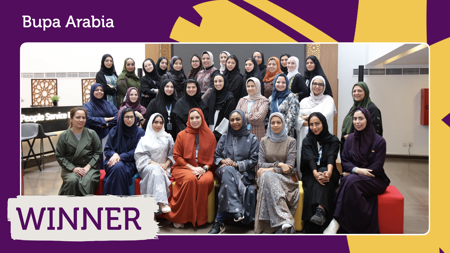

Bupa Arabia
When employee pulse surveys at Bupa Arabia, an associate business of the worldwide healthcare organisation, threw up consistently negative sentiments around lack of growth, promotions and pay concerns, it embarked on a talent management initiative praised by the PMAs judges as “well rounded” and demonstrating a real commitment to people and talent.
The 4People initiative was developed to attract, retain and develop top, diverse talent and to build an engaging culture. Previously, there was a 10-year-old grading structure with only eight career levels, resulting in limited opportunities for career growth. Most of the workforce (85 per cent) was compressed into two career levels (entry level and junior management level), which made it very hard to create growth opportunities for talent and to retain staff. It took more than six-and-a-half years on average to get promoted, and the pay for junior employees was below the market rate.
In response, data analysis was undertaken to study exit surveys, people pulse comments and feedback received from talent councils. Talent-mapping criteria were built by the C-suite and senior management team, with HR facilitation, to “ensure fair and consistent talent plotting during the massive restructure”. The organisation developed a more competitive reward structure and completed a pay adjustment plan by injecting an additional £16m into staff fixed pay (a total £48m over 12 months) to adjust the basic salaries for 1,496 employees.
Bupa Arabia developed job families, including a universal and standard proficiency scale, using descriptors for each competency proficiency level; a review of the promotion policy; and a heatmap to indicate possible career moves within and across job families. Diversity was a key focus throughout and targeted interventions were implemented against each of the organisation’s D&I pillars. For the inclusive leadership pillar, for example, all the organisation’s women were enrolled into leadership development programmes and all female people managers were enrolled on coaching/mentoring programmes. For the first time, the organisation implemented “diversity” key performance indicators as part of the chief executive’s KPIs.
The judges were impressed by the “ambitious” programme and the “clear impact from a few years of running the scheme”. In particular, they described the firm’s 0 per cent gender pay gap as “outstanding”.